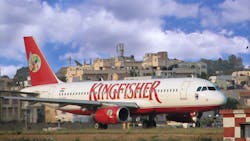Indian Aviation Facing Huge Hurdles to Meet Potential
NEW DELHI — India's fiercely competitive aviation sector must overcome "huge" infrastructure and other obstacles to achieve sound financial health, the industry's global chief warned Tuesday.
India's combined passenger numbers shrank 2.1% last year compared with global growth of four percent, according to industry figures.
The country of 1.2 billion people, of whom only a fraction fly, "is a great potential market", said International Air Transport Association (IATA) director-general Tony Tyler.
"But to realize that potential, some huge issues must be overcome," he said, referring to a host of troubles afflicting the market.
The sector, once vaunted as a symbol of India's economic vibrancy, has seen its fortunes fade in the face of aggressive fare rivalry, a slowing economy, over-expansion, rundown infrastructure, high airport charges and expensive fuel.
"Globally, fuel averages a third of an airline's cost. In India it accounts for 45%," Tyler told industry executives in New Delhi. "Operating in India presents bigger challenges than most other markets.”
But Tyler said some progress was being seen in the industry after airlines lost almost a combined $2 billion in the previous financial year.
Kingfisher Airlines, controlled by liquor baron Vijay Mallya and once the second-biggest carrier, remains grounded by a cash crunch. Authorities Tuesday deregistered 15 Kingfisher planes to allow leasing firms to reclaim them.
But India's biggest airline, no-frills IndiGo, is profitable.
Smaller rival SpiceJet and Jet Airways, India's second-largest carrier, returned to the black in the most recent financial quarter and state-run Air India may post its first operating profit in years, Tyler noted.
Importantly, the government "deserves congratulations" for opening up the airline sector to infuse vital foreign investment, allowing overseas carriers to buy up to 49% stakes in their Indian peers, Tyler added.
Reports have abounded about possible alliances between local carriers and international airlines since India eased the investment rules last September.
Jet has said it is in discussion with Abu Dhabi-based Etihad Airways, with media reports suggesting the Indian carrier could sell up to a 24% holding for $300 million.
The Foreign Investment Promotion Board has cleared a plan by no-frills Kuala Lumpur-based airline AirAsia to own a 49% stake in a joint venture airline with the Tata group and a private investor.
The venture still needs aviation ministry approval and Aviation Minister Ajit Singh told reporters separately he had not received any application, adding there were still some unidentified "procedural issues."
But AirAsia's chief Tony Fernandes tweeted that the airline planned to start hiring for its India operation "soon," declaring "India here we come.”
If the sector can fly through the turbulence, industry studies suggest India could be the world's third-largest aviation market by 2020, up from ninth currently, handling 336 million domestic and 75 million international passengers.
Penny MacRae, AFP
Copyright Agence France-Presse, 2013
About the Author
Agence France-Presse
Copyright Agence France-Presse, 2002-2025. AFP text, photos, graphics and logos shall not be reproduced, published, broadcast, rewritten for broadcast or publication or redistributed directly or indirectly in any medium. AFP shall not be held liable for any delays, inaccuracies, errors or omissions in any AFP content, or for any actions taken in consequence.
